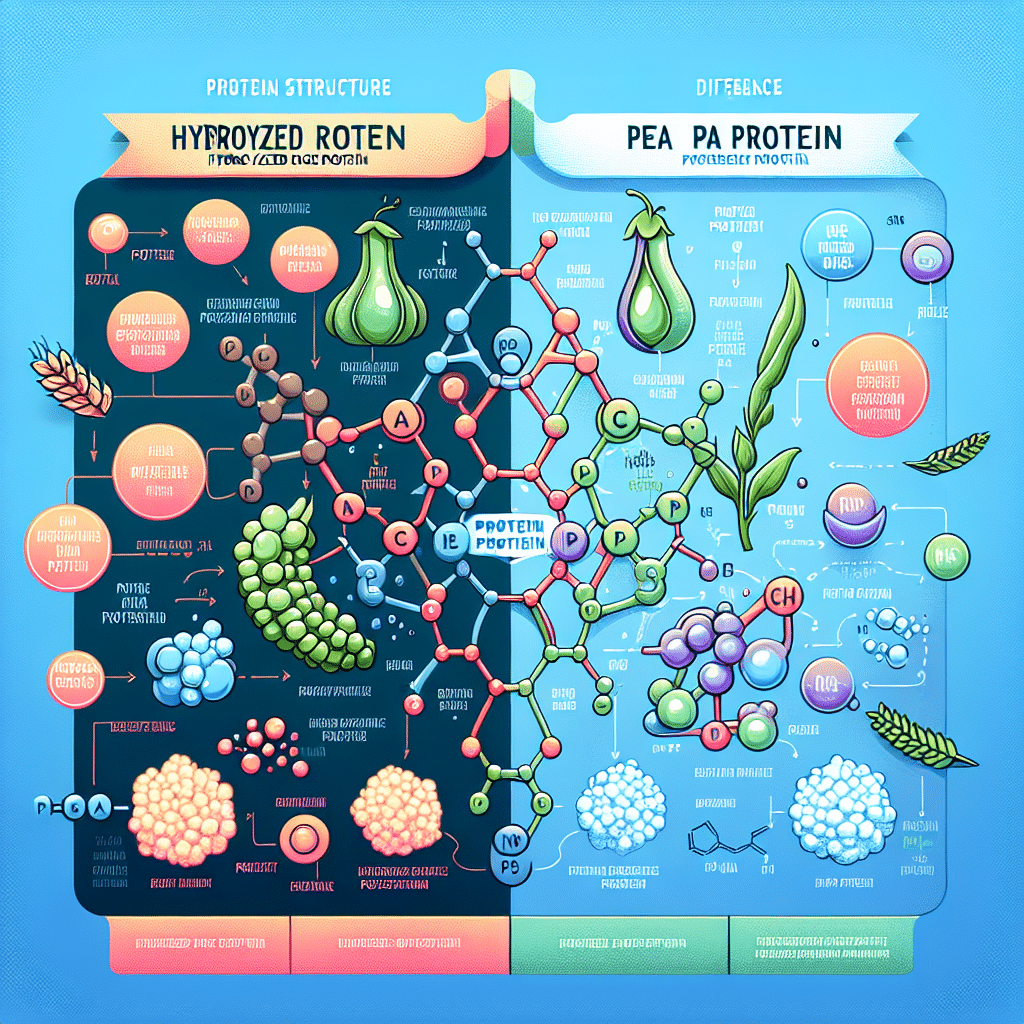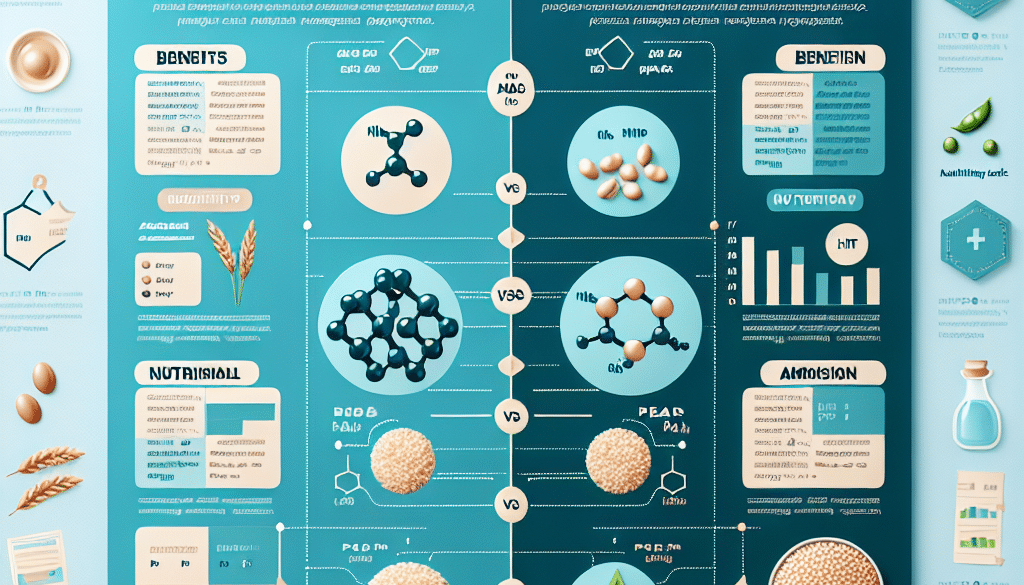Hydrolyzed Rice vs Pea Protein: Comparison
-
Table of Contents
- Hydrolyzed Rice vs. Pea Protein: An In-Depth Comparison
- Understanding Plant-Based Proteins
- What is Hydrolyzed Rice Protein?
- What is Pea Protein?
- Nutritional Profile Comparison
- Digestibility and Absorption
- Applications in Food and Supplements
- Sustainability and Environmental Impact
- Case Studies and Research
- Consumer Preferences and Trends
- Conclusion: Key Takeaways
- Discover ETprotein’s High-Quality Protein Products
Hydrolyzed Rice vs. Pea Protein: An In-Depth Comparison

As the demand for plant-based proteins continues to rise, consumers and manufacturers alike are exploring various sources to meet nutritional needs and preferences. Among the plethora of options, hydrolyzed rice protein and pea protein have emerged as two popular choices. This article delves into the specifics of each, comparing their nutritional profiles, digestibility, applications, and sustainability to help you make an informed decision.
Understanding Plant-Based Proteins
Before we dive into the specifics of hydrolyzed rice and pea proteins, it’s essential to understand the broader context of plant-based proteins. Unlike animal proteins, plant-based proteins are derived from sources like legumes, grains, and seeds. They are gaining popularity due to their lower environmental impact, suitability for those with dietary restrictions, and various health benefits.
What is Hydrolyzed Rice Protein?
Hydrolyzed rice protein is derived from brown rice and is created through an enzymatic process that breaks down the rice’s carbohydrates and proteins. This process results in a protein that is hypoallergenic, easily digestible, and has a relatively neutral taste. It’s a complete protein, containing all nine essential amino acids, although it’s typically lower in lysine compared to other protein sources.
What is Pea Protein?
Pea protein is extracted from yellow split peas and is a high-quality alternative to soy and whey proteins. It’s rich in branched-chain amino acids (BCAAs), particularly arginine, which is beneficial for heart health and blood flow. Pea protein is also hypoallergenic and easy to digest, making it a suitable option for many individuals.
Nutritional Profile Comparison
- Amino Acid Content: Both hydrolyzed rice and pea proteins contain all nine essential amino acids, but their concentrations vary. Pea protein is richer in arginine and lysine, while rice protein offers a balanced profile but with lower levels of lysine.
- Protein Content: Pea protein typically contains more protein per serving compared to rice protein, making it a slightly more concentrated source of this macronutrient.
- Carbohydrates and Fiber: Rice protein may have a higher carbohydrate content due to its grain origin, whereas pea protein is often lower in carbs and higher in fiber.
- Fat Content: Both proteins are low in fat, but pea protein may have slightly higher amounts of healthy unsaturated fats.
Digestibility and Absorption
Protein digestibility is crucial for the body to utilize the amino acids effectively. Hydrolyzed rice protein is pre-digested, which means it’s easier for the body to absorb. Pea protein also boasts high digestibility, comparable to that of animal proteins, making both excellent choices for those concerned about protein absorption.
Applications in Food and Supplements
Hydrolyzed rice and pea proteins are versatile and can be used in a variety of products. They are commonly found in protein powders, bars, and plant-based meat alternatives. Their differing textures and flavors can influence the choice of protein for specific applications.
Sustainability and Environmental Impact
Both rice and pea proteins have a lower environmental footprint compared to animal-based proteins. However, peas require less water to grow than rice and can fix nitrogen in the soil, which can reduce the need for fertilizers. This makes pea protein a more sustainable option overall.
Case Studies and Research
Several studies have compared plant-based proteins to traditional animal proteins. For instance, research has shown that pea protein can support muscle growth effectively, similar to whey protein. Studies on rice protein have also demonstrated its ability to support muscle repair and growth, though more research may be needed.
Consumer Preferences and Trends
Consumer trends are shifting towards plant-based proteins due to health concerns, ethical considerations, and environmental reasons. Both hydrolyzed rice and pea proteins cater to these trends, offering viable alternatives to animal-derived proteins.
Conclusion: Key Takeaways
In conclusion, both hydrolyzed rice and pea proteins offer unique benefits and can be excellent choices depending on individual dietary needs, preferences, and sustainability concerns. Pea protein stands out for its higher protein content and sustainability, while hydrolyzed rice protein is noted for its hypoallergenic properties and ease of digestion.
Discover ETprotein’s High-Quality Protein Products
If you’re looking for top-notch plant-based protein options, ETprotein offers a range of products that cater to various needs. Their organic rice protein and pea protein are just a few examples of their commitment to quality and sustainability. Explore their offerings to find the perfect protein solution for your dietary requirements.
About ETprotein:
ETprotein, a reputable protein Chinese factory manufacturer and supplier, is renowned for producing, stocking, exporting, and delivering the highest quality organic bulk vegan protein and plant proteins. They include Organic rice protein, clear rice protein, pea protein, clear pea protein, pumpkin seed protein, sunflower seed protein, mung bean protein, etc. Their offerings, characterized by a neutral taste, non-GMO, allergen-free attributes, cater to a diverse range of industries. They serve nutraceutical, pharmaceutical, cosmeceutical, veterinary, as well as food and beverage finished product distributors, traders, and manufacturers across Europe, USA, Canada, Australia, Thailand, Japan, Korea, Brazil, and Chile, among others.
ETprotein specialization includes exporting and delivering tailor-made protein powder and finished nutritional supplements. Their extensive product range covers sectors like Food and Beverage, Sports Nutrition, Weight Management, Dietary Supplements, Health and Wellness Products, and Infant Formula, ensuring comprehensive solutions to meet all your protein needs.
As a trusted company by leading global food and beverage brands and Fortune 500 companies, ETprotein reinforces China’s reputation in the global arena. For more information or to sample their products, please contact them and email sales(at)ETprotein.com today.














